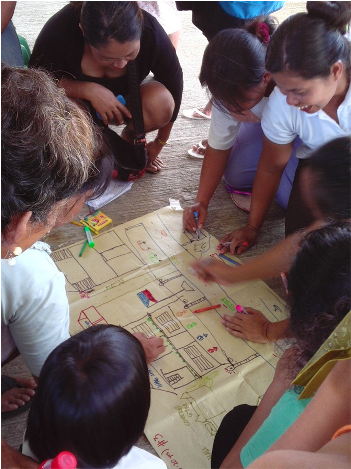
To celebrate International Volunteer Day (IVD) on the 5th December, the team of researchers working on the VSO led research project 'Valuing Volunteering' are sharing two blogs each to highlight key global themes on volunteering.
'Valuing Volunteering' is a major systemic action-research project based in five countries (Nepal, Philippines, Mozambique, Ghana and Kenya) looking at how volunteering impacts on poverty. The Institute of Development Studies provide academic leadership whilst the project is supported by numerous in-country partners, including the Government of Nepal's National Development Volunteer Service.
This week, we will be posting the blogs on Sharing4Good. We invite you to be part of the debate by posting comments!
In the first of this week's blogs, researcher Jody Aked who has been working on the project for the past 18 months in the Philippines explores the relationship between volunteering and dependency, drawing interesting comparisons between governments and the private sector...
Dependency. It is the thing to be avoided in international development efforts. Positioned as the opposite of sustainability, it is explained as people living in marginalisation or poverty being in some way reliant on support or help from outsiders. I have noticed that in a sort of sleepy, languid way we have slipped into equating length of time working with a community as a proxy indicator of dependency. It is an unwritten assumption justifying short-term over long-term funding and it affects how we design our programmes. I wonder whose interests this assumption is benefiting.
As part of the Valuing Volunteering research, I have worked with volunteer programs in universities and locally-based NGOs who are struggling internally and externally to justify a relationship with a community that surpasses 10 years. The sorts of questions they ask themselves in our reflection spaces on volunteer programme effectiveness are:
“‘Have we created dependency? What should an exit strategy look like?”
Using Valuing Volunteering’s systemic approach, we have been opening up conversations with lots of different stakeholders to learn from them. On a number of occasions I have asked the communities themselves,
“Isn’t it time after 10 years that the volunteers should go and support another community?”
Many will tell me about the importance of ‘bayanihan’ – a Filipino concept of everyone working together for a common goal. Others tell me about the boost or ‘lift’ external help provides people. It is an encouragement that brings energy to community efforts so it always nice to have.
In other circumstances my question has been met with dismay and visible distress. The first of three conversations that resonated with me took place with coconut farmers who have had their land compulsory purchased (at a very low price) by government to make way for a new airport in the province of Albay. The second was with informal settlers in Metro Manila who have been living in a state of long-term uncertainty because of a major road building plan threatening displacement. The third was with a People’s Organisation which looks after a Community-Based Forest Management Area in the Visayas. They were encouraged to sign a contract with a private investor to cultivate cash crops like pineapples for direct export to the Chinese market.
Listening to their concerns, I began to understand the scale of the development challenges these groups face. The self-organisation required of communities to create a space to voice concerns and rights in formal decision-making platforms when political and economic pressures are working hard in the background to silence or discredit them is an arduous and long process. It requires a sure-footedness and level of confidence to maintain a position at a negotiating table that is typically gained through years of grooming in corporate or political life. And it requires a steadfastness and level of resilience to overcome set-backs not easy to come by.
It got me thinking how dependency is a convenient mantra for a global economic system that does very well for the 1% from exploiting people and their assets for profit. It is interesting, for example, that as development workers we do not lay awake at night feeling anxious that oil companies have not managed to de-couple themselves from government subsidies to move their very ‘grown-up’ industry from dependency to self-reliance. At the same time we can be certain that we will be asked to demonstrate that our livelihood initiatives supporting communities to adapt to the effects of climate change can achieve sustainability within a few years.
In one multi-stakeholder discussion with members of a community, volunteers and support staff we realised we need to unpick what we mean by dependency and sustainability to answer our questions. For sure, after ten years we should be expecting that communities can run their own meetings and take the initiative on the direction they want to go and how to get there. But to expect that these capacities can translate into being able to tackle deep-seated injustice by themselves is probably naïve.
At a societal level we seem happy to accept that governments can depend on one another for assistance. We describe them as bi-lateral agreements or ‘special relationships’. And we are comfortable when companies link with government sectors under the guise of public-private partnerships. Yet, we are uneasy when we talk about long-term partnerships to change the rules of the game, ‘shoulder to shoulder’ with the people who are forgotten by the rising stars.
It is through this study about the way volunteers work that I am learning a more nuanced understanding of relationships for development. A more ‘human’ development that takes care of people is built on solidarity and friendship. As one community member recalled on her interactions with volunteers,
“We experience good relations as if we are almost relatives”.
Volunteers may not bring tonnes of financial assistance. And they may themselves be limited when it comes to shifting wider systemic issues which act as barriers to community development. But the credibility or ‘symbolic capital’ afforded by volunteers and the organisations they represent is an important force for how communities feel about themselves (“what we feel, it becomes lighter because of the concern we experience”) and how others view them (“because of the volunteer maybe the Chinese were afraid. If ever he has a plan to fool with us and now he learned this organisation cannot be fooled”).
As Lizzie (VV Researcher Nepal) summed up in one of our cross-country analysis sessions,
“Creating spaces where people are self-directed with others is really important … because you can be overwhelmed with what you face and change can feel so small but with group processes it can feel very different psychologically”
In an ecosystem where the motives of all those involved are not transparent, I have witnessed how a volunteering programme can result in a web of volunteer-community interactions that lead to trusting and lasting relationships built on shared experiences, different worldviews and a motivation to work for the common good. In a context where change at the political and economic level can be stubbornly slow I can see the potential for long-term relationships established in the spirit of volunteerism to be a foundation for resilience and adaptability instead of dependency.
Jody Aked










Add new comment